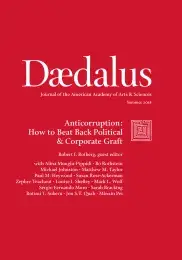Corruption & Purity
Corruption is a complex and contested concept that raises difficult ethical and legal issues at the borderline between individuals’ public and private roles. What is appropriate or required in one role may be inappropriate or even illegal in another. Based on these concepts of role and responsibility, I begin this essay by analyzing three cases that fit comfortably into the “illegal corruption” category: so-called grand and petty corruption and electoral fraud. These categories express widely accepted boundaries at the interface between public power and private wealth. I then discuss more ambiguous cases, such as lobbying and campaign finance, that demand nuanced legal and policy solutions. Responses to both types of behavior must go beyond law enforcement to include the reorganization of government institutions and their relationship to the private sector.
The term “corruption” is often used to condemn behavior that violates the speaker’s values. It evokes notions of putrefaction, rot, and decay; corrupt acts undermine a pure ideal. But if not everyone shares the same values, the term can imply an overbearing insistence on one’s own view of what is right and good. This produces much conceptual confusion. Many commentators enshrine specific values and assert that deviations from those values are corrupt. These scholars conflate the mechanisms that produce the harm with the harm itself.
If one takes majority rule as the gold standard for public action, then deviations from that voting mechanism are corrupt. If one places the competitive market on a pedestal, then monopoly power is corrupt. If expertise sets the standard, then efforts to undermine science are corrupt. If, as Bo Rothstein has argued, the state ought to treat everyone impartially, then favoritism is corrupt.1 In the same spirit, Alina Mungiu-Pippidi has asserted that corruption constitutes deviations from ethical universalism, a view also held, with some modifications, by Robert Rotberg.2 Payoffs can undermine each of these . . .
